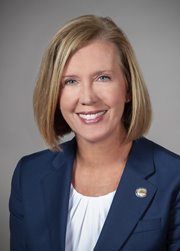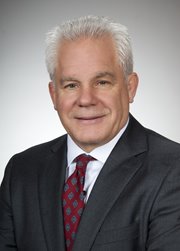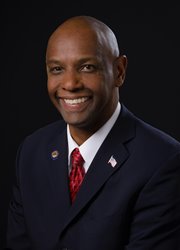On the Job recently caught up with three state legislators who used to be law enforcement officers to find out why they decided to make the jump and why their experience is valuable at the Statehouse.

REP. CINDY ABRAMS
R-Harrison
Law enforcement experience: 7 years with the Cincinnati Police Department
Political experience: Ohio House of Representatives, Harrison City Council
Question: With your experience in law enforcement, what drew you to politics?
Answer: Being a police officer allowed me to become involved locally and learn what was important to my community. I had the “boots on the ground” perspective of how governmental policy affected people’s lives. That experience encouraged me to become involved in government, first on City Council and now at the Statehouse; to be part of the decision-making process; and to ensure they have a positive effect.
Q: How does being a legislator compare to being a police officer?
A: The two are more similar than one would expect. Being a police officer taught me many skills that I still utilize today. In both roles, the days are busy so you must stay organized and take one thing at a time, whether that is a meeting on legislation or a radio run. Each day is different. But as a legislator, there is a larger scale, as we hear testimony on a wide variety of topics and make decisions that will affect 11 million people.
Q: How does your law enforcement experience affect how you legislate?
A: Communication is the key to both professions. I will always hear both sides of an issue and learn as much as I can before making a final decision. Even if I have a pre-existing opinion or stance, I firmly believe it is important to have all of the facts. Politics is a relationship business.
Q: Is there anything you wish more legislators knew about law enforcement officers?
A: Both professions have the same goal: to serve the people in order to protect them and give them a high quality of life. We can achieve that goal by working together, and I think many law enforcement officers would agree and be happy to collaborate in working toward that goal.
Q: Is there anything you wish more law enforcement officers knew about legislators?
A: We are communicators, we are here to serve you, and we want to hear your opinion on issues, especially those that directly impact you and your profession. I highly value the boots-on-the-ground perspective and will always appreciate your open and honest feedback.
Q: What would you tell a law enforcement officer considering whether to run for office?
A: Do it, and go all in. In the process, do not stray from your moral compass. In life and especially in politics, it is impossible to make everyone happy, even though you will feel pressure to do so. What makes a strong leader is someone who can stand firm in their values and beliefs. If you consistently do what you truly believe is best for the people you serve, people will see that and respect you for it.
 REP. PHIL PLUMMER
REP. PHIL PLUMMER
R-Dayton
Law enforcement experience: 30 years with the Montgomery County Sheriff’s Office, including 11 years as sheriff
Political experience: Ohio House of Representatives
Question: With your experience in law enforcement, why did you decide to run for state government?
Answer: I was the sheriff for three terms, so politics is my background. What drew me to the state legislature was the chance to address the failures in the criminal justice system, such as the opioid epidemic and proper mental-health treatment. I mean, the entire criminal justice system is costly; it’s not working. I was in law enforcement for 30 years — worked every day as hard as I could — and things seemed to get worse. So that tells me there’s a failure in the system.
Q: How does being a legislator compare to being a deputy or sheriff?
A: Well, being the sheriff, I was the executive branch, so I was able to call my own shots. I’d identify problems, come up with the solution to problems, get right on it. We really cut the opioid epidemic deaths in half. We did a great job with that. On the legislative side now, of course we get to change the laws and address what needs to be fixed more globally.
But the biggest difference is as sheriff, I could execute immediately. As a legislator, it’s a long, slow process. It’s frustrating; I don’t think I’ll ever get used to it. We have great bills pending that will help quality of life issues, but they haven’t moved due to various reasons. I don’t deal with that very well. I’m trying to slow down my expectations, but it’s just not in my DNA.
Q: Could you give an example of a bill that is stuck?
A: House Bill 1, which deals with getting people’s records expunged or sealed. Drug addicts, when they get into treatment and they do what they’re supposed to do, then let’s clean their records up and get them back in the workforce to be productive citizens. Because if you don’t, they’re going to go back to using and the street life that they know. That’s a very important bill.
Q: Is there anything you wish more legislators knew about law enforcement officers?
A: I wish they knew more about the criminal justice system as a whole. It’s too convoluted. It needs to be revised. Let’s revamp. We’ve got to hold people accountable and then rehabilitate them. Our prisons used to be very good at rehabilitation, but they’re not that strong anymore. We’ve got to get back to that.
Q: Is there anything you wish more law enforcement officers knew about legislators?
A: Law enforcement officers are good grassroots people and they know the holes in the system. I wish they’d reach out to legislators and make suggestions on what needs changed. They do occasionally, like increasing drug penalties and stuff like that, but they’re grassroots people. They live it every day and they could probably have some good solutions for us as well.
Q: What would you tell a law enforcement officer considering whether to run for office?
A: I would tell them that it’s a calling. It’s a challenge. Once you get into the seat, everybody’s going to tell you what you’re doing wrong, what you’re doing right — how everybody else could do it better. You’ve got to be a strong person and you’ve got to stand for your values.
 SEN. CECIL THOMAS
SEN. CECIL THOMAS
D-North Avondale
Law enforcement experience: 27 years with the Cincinnati Police Department
Political experience: Ohio Senate, Cincinnati City Council
Question: What drew you to politics?
Answer: Politics found me. As I was retiring from the police department, I was recruited to become the executive director of the Cincinnati Human Relations Commission. Shortly thereafter, in 2001, we had civil unrest in Cincinnati, after a young man named Timothy Thomas was shot and killed by officers when he was unarmed. It was total chaos, not like what’s going on today. [He spoke in early August.] I was looking at the mayor, saying, “I tried to tell you!” because I had been warning anyone I could think of that the relationship between police and the African American community had been deteriorating.
Once everything somewhat stabilized, the mayor charged me with figuring out, what were we doing wrong that would allow us to have civil unrest in the 21st century? We convened commissions and found five factors: poor community-police relations; lack of health care and safe housing; and, especially for African- American males ages 14 to 25, lack of education and jobs. And we knew we needed to deal with that because those were the ones out there setting fires and throwing bricks.
So I found a program developed in Boston that involved putting mentors on street corners to engage with these young men and assist them in getting their lives back on track. The Greater Cincinnati Foundation gave me two years of seed money, and when that ran out, I went to the Cincinnati City Council. Well, they said, “The city’s back to normal now. We’re not going to fund your program.” I was so upset that I decided I would run for City Council. And I won a seat.
The Cincinnati Initiative to Reduce Violence has been funded to this day, and the state liked the program so much, it’s been retrofitted to other Ohio cities, too.
Q: How does your law enforcement experience affect how you legislate?
A: I bring a unique perspective for the other senators to hear. I’ll use the example, we always want to pass laws that say if a person does this, then we’re going to increase the penalty and you’ll get more time in jail. Having seen what impacts people’s quality of life, I can say to a senator, “Well, maybe you need to rethink this particular bill because you cannot lock your way up out of this problem.”
See, as a police officer, I worked undercover narcotics for a long time, and I would lock folks up. But then, five or 10 years later, I’d see their same name again and think, “Wow, did he get out of jail?” Well, what I’d find was that the individual I locked up, this was his son, and he grew up in the exact same environment. That cycle was never broken because we continue to do the same thing over and over.
For example, I was in the community for the Hundred Man March, a walk to get in folks’ heads and encourage the young men to get in programs. While we were walking, I stopped to talk to a group of kids. They were maybe 15, 16, 18. The rest of the marchers kept going. And while I was talking to the kids, they started pointing back up the street.
I looked back and there was a young man lying in the street and a car stopped in front of him. I’m thinking, “Oh wow, that guy got hit by a car.” So I went back to see if I could be of help and as soon as I got there, I saw people lying on the sidewalks on both sides and kids and everything else. This lady I knew came up and she said, “Mr. Thomas, this boy just got shot.”
I said, “What!?”
She said, “Yeah, we were all in the park across the street and shots rang out and everybody started running and they were shooting at him.”
He ran and collapsed in the street. I tried to calm him because he was trying to get up. But he was injured, seriously. I remember that. He died right there. Then I looked around at the people on the street. There were mothers and little children clinging to their mothers. You could tell these children, ages 5 through 12, were just traumatized to see this.
So I say to senators, “Before we just start throwing more time on these folks, let’s see if we can come up with some juvenile program that will get these kids into community learning centers.” That way, their 15-year-old sister isn’t responsible for keeping them from running around while Mom’s at work. And at the centers, there are committed adults to help the children do all that they need to do. And that works very well, because we’ve added quality of life improvements, too, like eye doctors and dentistry programs.
And so I bring a better understanding of what certain legislation could be. I give the legislature a real firsthand account of what goes on in these urban cores as well as other communities suffering from poverty, like Appalachian communities. We had a significant Appalachian population in one of the districts that I worked in, District 3 in Cincinnati and an area called Lower Price Hills. Their plight is really no different than the African American community. Poverty does not discriminate.
Q: What would you tell a law enforcement officer considering whether to run for office?
A: Bring your life experiences and also don’t be pro-police in a vacuum. I would say to the officer, nothing is perfect, but our role helps our communities the most when we try to be peace officers, rather than law enforcement. By law enforcer I mean, “The law is the law, I’m sorry. Lock you up, throw away the key, goodbye.”
A peace officer comes in and says, “What can I do for this family to try to help maintain peace?” If you want to be a person who’s going to thrive in politics, use that type of methodology when you’re talking to those who you want to vote for you.